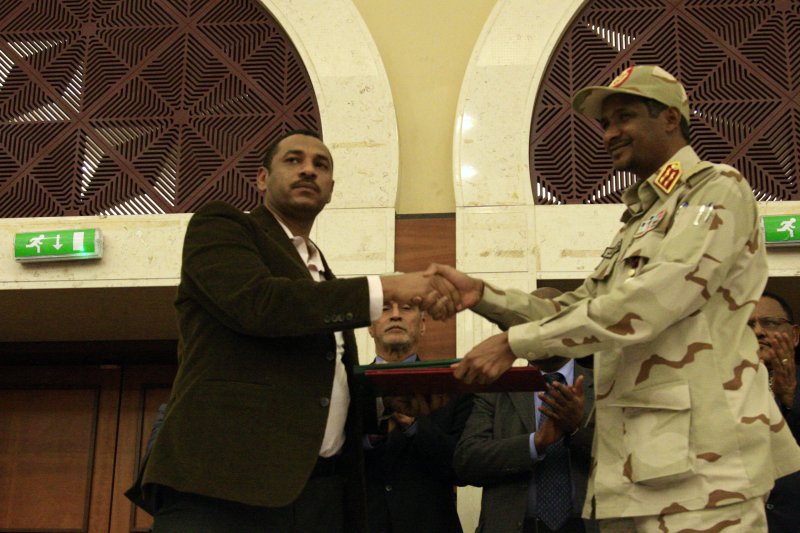Sudan military council official Mohamed Hamdan Dagalo shakes hands Wednesday with Alliance for Freedom and Change leader Ahmad al-Rabiah, after signing a power-sharing agreement in Khartoum, Sudan. Photo by EPA-EFE
July 17 (UPI) -- After months of turmoil and violence, military rulers in Sudan signed a deal Wednesday to share power with civilians until elections are held in about three years.
The deal was reached after all-night talks in Khartoum resulted in a compromise. The deal was announced with a public signing in front of media and officials.
Under the latest deal, a rotating council of military and civilians will rule the country for the next 21 months until a new civilian-run government takes over. After that, elections will be held. Sudanese leaders will begin the process of drafting a constitution Friday.
Military council deputy Mohamed Hamdan Dagalo called this a "historic moment" for Sudan.
"I am pleased this morning to give this good news ... to the great Sudanese people of the signing of the political agreement," he said.
The military seized power after longtime leader Omar al-Bashir was ousted in April. The pro-democracy Alliance for Freedom and Changes group, who'd opposed Bashir, then turned their attention to the military council. In June, protesters conducted peaceful sit-ins that were met with violence from ruling military forces. More than 100 people died, many were hurt and there were reports women were raped. Sudan's military rulers said they didn't order the attacks.
One sticking point of the power-sharing deal was settling on accountability for human rights abusers. Some Sudanese welcome the new deal, while others doubt it will stop the violence.
"This is a political agreement, and there are divisions between the two sides," teacher and activist Khalda Yacoub said. "The problem is that the members of the [ruling military council] are part of the former regime and they need to change the way they deal with people."
"I think our crisis should only be solved politically," citizen Mohamed Eissa said. "The idea of having a radical change is impossible. This country is very fragile.
"I have worked in different places of Sudan and I know the amount of weapons there are, so in our best interest is to reach a deal."















